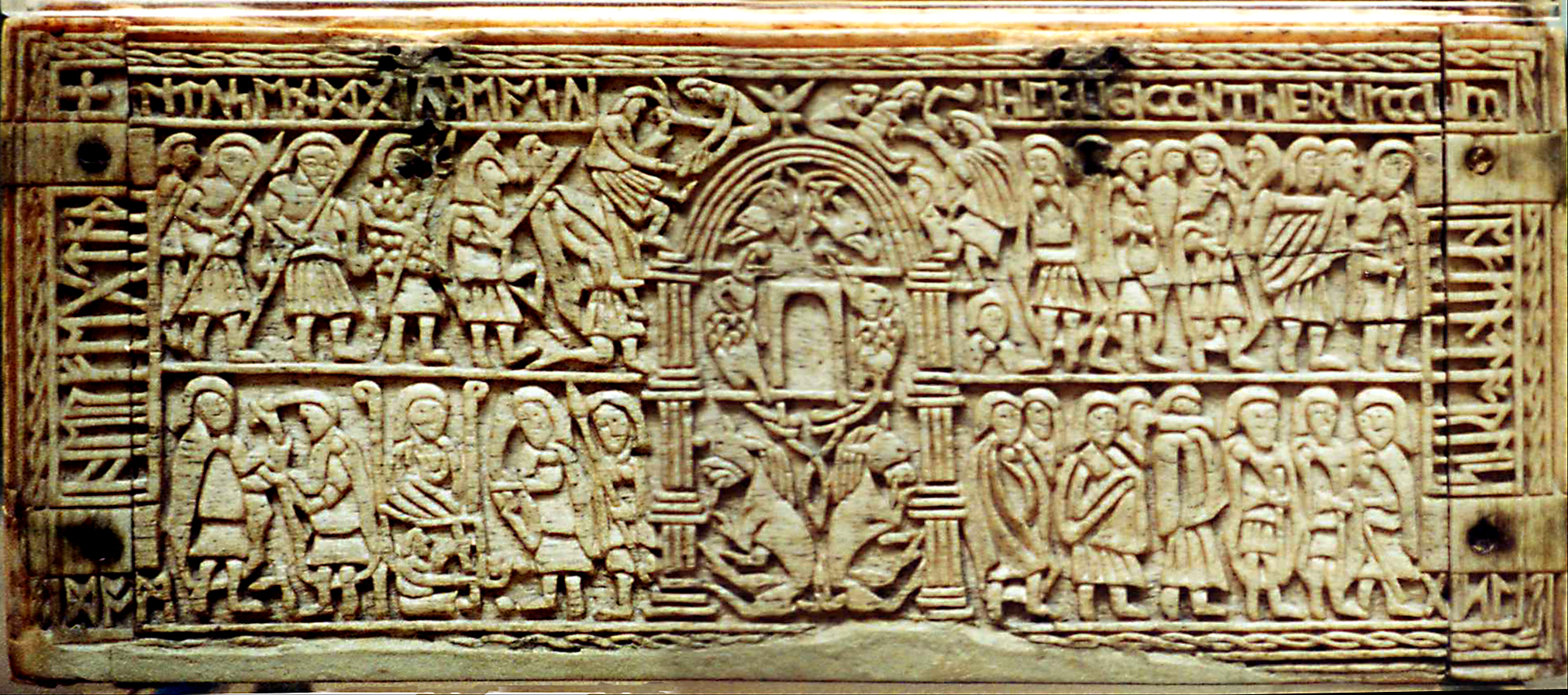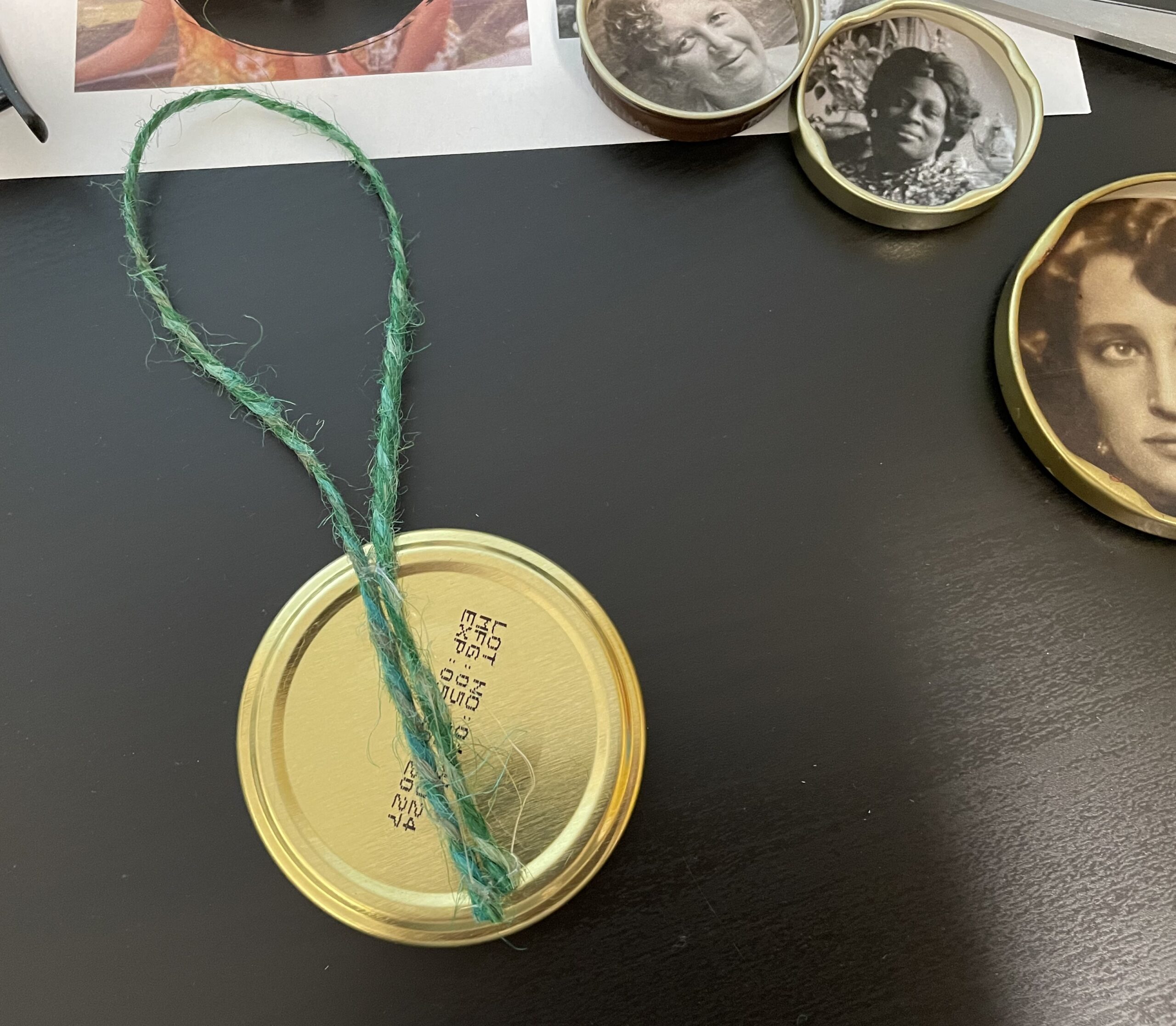Following is my translation of the Old English Rune poem. I have tried to be as literal as makes sense, but of course I had to take some poetic liberties to make it flow. I have removed the Christian overtones except where they were blatantly explicit, and rendered faithfully terms like “drihten” as simply chieftain. The final, controversial rune descriptions, I will discuss at greater length in another post.
Old English
1. ᚠ Feoh byþ frofur fira gehwylcum;
sceal ðeah manna gehwylc miclun hyt dælan
gif he wile for drihtne domes hleotan.
2. ᚢ Ur byþ anmod ond oferhyrned,
felafrecne deor, feohteþ mid hornum
mære morstapa; þæt is modig wuht.
3. ᚦ Ðorn byþ ðearle scearp; ðegna gehwylcum
anfeng ys yfyl, ungemetum reþe
manna gehwelcum, ðe him mid resteð.
4. ᚩ Os byþ ordfruma ælere spræce,
wisdomes wraþu ond witena frofur
and eorla gehwam eadnys ond tohiht.
5. ᚱ Rad byþ on recyde rinca gehwylcum
sefte ond swiþhwæt, ðamðe sitteþ on ufan
meare mægenheardum ofer milpaþas.
6. ᚳ Cen byþ cwicera gehwam, cuþ on fyre
blac ond beorhtlic, byrneþ oftust
ðær hi æþelingas inne restaþ.
7. ᚷ Gyfu gumena byþ gleng and herenys,
wraþu and wyrþscype and wræcna gehwam
ar and ætwist, ðe byþ oþra leas.
8. ᚹ Wenne bruceþ, ðe can weana lyt
sares and sorge and him sylfa hæfþ
blæd and blysse and eac byrga geniht.
9. ᚻ Hægl byþ hwitust corna; hwyrft hit of heofones lyfte,
wealcaþ hit windes scura; weorþeþ hit to wætere syððan.
10. ᚾ Nyd byþ nearu on breostan; weorþeþ hi þeah oft niþa bearnum
to helpe and to hæle gehwæþre, gif hi his hlystaþ æror.
11. ᛁ Is byþ ofereald, ungemetum slidor,
glisnaþ glæshluttur gimmum gelicust,
flor forste geworuht, fæger ansyne.
12. ᛄ Ger byþ gumena hiht, ðonne God læteþ,
halig heofones cyning, hrusan syllan
beorhte bleda beornum ond ðearfum.
13. ᛇ Eoh byþ utan unsmeþe treow,
heard hrusan fæst, hyrde fyres,
wyrtrumun underwreþyd, wyn on eþle.
14. ᛈ Peorð byþ symble plega and hlehter
wlancum [on middum], ðar wigan sittaþ
on beorsele bliþe ætsomne.
15. ᛉ Eolh-secg eard hæfþ oftust on fenne
wexeð on wature, wundaþ grimme,
blode breneð beorna gehwylcne
ðe him ænigne onfeng gedeþ.
16. ᛋ Sigel semannum symble biþ on hihte,
ðonne hi hine feriaþ ofer fisces beþ,
oþ hi brimhengest bringeþ to lande.
17. ᛏ Tir biþ tacna sum, healdeð trywa wel
wiþ æþelingas; a biþ on færylde
ofer nihta genipu, næfre swiceþ.
18. ᛒ Beorc byþ bleda leas, bereþ efne swa ðeah
tanas butan tudder, biþ on telgum wlitig,
heah on helme hrysted fægere,
geloden leafum, lyfte getenge.
19. ᛖ Eh byþ for eorlum æþelinga wyn,
hors hofum wlanc, ðær him hæleþ ymb[e]
welege on wicgum wrixlaþ spræce
and biþ unstyllum æfre frofur.
20. ᛗ Man byþ on myrgþe his magan leof:
sceal þeah anra gehwylc oðrum swican,
forðum drihten wyle dome sine
þæt earme flæsc eorþan betæcan.
21. ᛚ Lagu byþ leodum langsum geþuht,
gif hi sculun neþan on nacan tealtum
and hi sæyþa swyþe bregaþ
and se brimhengest bridles ne gym[eð].
22. ᛝ Ing wæs ærest mid East-Denum
gesewen secgun, oþ he siððan est
ofer wæg gewat; wæn æfter ran;
ðus Heardingas ðone hæle nemdun.
23. ᛟ Eþel byþ oferleof æghwylcum men,
gif he mot ðær rihtes and gerysena on
brucan on bolde bleadum oftast.
24. ᛞ Dæg byþ drihtnes sond, deore mannum,
mære metodes leoht, myrgþ and tohiht
eadgum and earmum, eallum brice.
25. ᚪ Ac byþ on eorþan elda bearnum
flæsces fodor, fereþ gelome
ofer ganotes bæþ; garsecg fandaþ
hwæþer ac hæbbe æþele treowe.
26. ᚫ Æsc biþ oferheah, eldum dyre
stiþ on staþule, stede rihte hylt,
ðeah him feohtan on firas monige.
27. ᚣ Yr byþ æþelinga and eorla gehwæs
wyn and wyrþmynd, byþ on wicge fæger,
fæstlic on færelde, fyrdgeatewa sum.
28. ᛡ Iar byþ eafix and ðeah a bruceþ
fodres on foldan, hafaþ fægerne eard
wætre beworpen, ðær he wynnum leofaþ.
29. ᛠ Ear byþ egle eorla gehwylcun,
ðonn[e] fæstlice flæsc onginneþ,
hraw colian, hrusan ceosan
blac to gebeddan; bleda gedreosaþ,
wynna gewitaþ, wera geswicaþ.
Modern English
1. Cattle/Wealth is comfort to everyone;
Shall every man deal it out freely
if he will gain the praise of his lord.
2. Aurochs is steadfast and greatly-horned,
a very fierce beast, it fights with its horns
the splendid moor-walker; that is a noble wight.
3. Thorn is painfully sharp;
evil to any thegn that it touches,
extremely cruel to whomsoever might rest among such.
4. The Heathen God/Woden is the chieftain of all speech,
the sustenance of wisdom and comfort to the wise
and every noble’s pleasure and hope.
5. Riding is in the hall to warriors everywhere
simple and yet very strenuous, to the one that sits upright
on a powerful steed over miles of road.
6. The torch is by living beings everywhere known by its flame
clear and bright, it burns oftenest
where the nobles rest within.
7. A Gift among mankind is glory and praise,
support and dignity and to poor wretches everywhere
it is kindness and sustenance for those with little else.
8. Delight he enjoys who knows little of sorrows and sadness,
and who himself has breath and bliss and the security of a fortress (town?)
9. Hail is the whitest of grains; it swirls through heaven’s reaches,
it roils in the wind’s gusts, becoming water afterwards.
10. Hardship is duress upon the heart; it becomes to the sons of men
help and salvation however, if they hearken to it in time.
11. Ice is exceedingly cold, immeasurably slippery,
It glistens glass-clear and much like gems,
a floor wrought of frost, fair to see.
12. The Year is hopeful to men, when God, the holy King of Heaven,
suffers the earth to bring forth shining fruits
for rich and poor alike.
13. The yew is on the outside a rough tree,
hard and fast in the earth, supported by its roots,
a guardian of flame and a joy upon an estate.
14. A Game-piece is at banquet play and laughter to the proud,
where warriors sit blithely together in the feast-hall.
15. The Elk-sedge is found most oft in a marsh;
it waxes in the water and makes a grim wound,
covering with blood every warrior who touches it.
16. The Sun is ever in the hopes of seafarers
when they journey away over the fishes’ bath,
until the brine-stallion bears them to land.
17. Tiw is a certain token, it keeps troth well with princes;
it is ever on its course over the mists of night, it never fails.
18. The Birch has no fruits; yet even so it bears twigs, without seeds.
Splendid are its branches and fairly adorned, laden with leaves is
its lofty crown which reaches to the skies.
19. Horses are for earls the joy of noblemen,
a steed proud in its hooves, where the heroes about him,
wealthy on warhorses, weave their speech,
and ever a comfort to those on the move.
20. Man is in mirth, loved by his kinfolk;
though every one must depart to another place,
because the ruler wishes, through his own doom,
that our wretched flesh be commended to the earth.
21. The waters seem to men to be broad,
if they should venture upon an unstable ship,
and the sea-waves terrify them so,
and the brine-stallion heeds not his bridle.
22. Ing was first among the Eastern Danes
seen by men, until he soon afterwards
departed over the ways, a wain followed after.
Thus bold men named this hero.
23. An estate is very precious to every man,
if he might enjoy there his rights and appanage,
in his household with its fruits most often.
24. The day is the great chieftain’s message, dear to men,
the renowned light of the Measurer, a mirth and gladness
to the prosperous and the wretched, useful to all.
25. The oak is on Earth for the sons of men
fodder for the flesh, it frequently ferries
over the gannet’s bath; The spear-waves find
whether the oak keeps noble troth.
26. The ash is very tall, dear to mankind,
stout in its trunk, its hilt is rightfully fixed,
though it be attacked by many men.
27. Axe-Iron/Seax is a source of joy and honour to every prince and eorl;
it looks well on a horse and is reliable gear for a journey.
28. (Salamander/Amphibian) is a river fish and yet it always feeds on land;
it has a fair abode encompassed by water, where it lives in bliss.
29. The Grave is loathsome to every noble,
when soon the flesh begins,
the corpse to cool, to choose the earth
pale for its bed; the fruits fall,
joys pass away, men fail.



